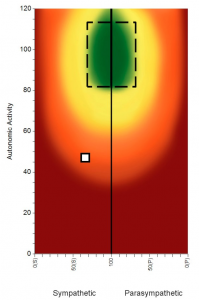Here it comes. Can you feel it in the air? The Season of STRESS is upon us! What is it about this time of year that sets you off?
Is it the worry that you won’t be ready for the holidays?
Is it the stress of holiday shopping that gets to you?
Is it the extra financial burden?
Or is it the thought about gathering with those relatives who just seem to know how to push your buttons?
How does your body react to the extra stress of the holidays?
Any way you slice it, the stress of the holidays affects us, and everyone experiences different results. Some of us might experience some gastric disturbances; some may feel tightness across the shoulders and into your neck, while others might be plagued with frequent headaches.
Do you have strategies to deal with it?
Do you know when it first hits?
Do you have an idea of how bad it will get?
It should come as no surprise to know that stress builds up over time, even before symptoms hit. Wouldn’t it be good to know before it makes your holidays miserable? Well, you’ve come to the right place! We can help you reduce the affects it has on your body.

How does MHWC measure your stress?
We have a very sophisticated piece of equipment called a
Pulse Wave Profiler, which calculates Heart Rate Variability.
It measures the balance between our sympathetic and parasympathetic nervous system. When we are under stress we run in sympathetic dominance. This is also known as fight or flight. When we get hit with that
saber-toothed tiger; are we going to fight or run? As depicted on the graph above, this person is well into sympathetic dominance, as indicated by the tiny white box. This is where many people “live” today. If you want to see how you are coping with stress and where you might plot on the graph, ask to have your Heart-Rate Variability measured today. It is a good thing to actually see if our perception of stress is correct.
Once we know this about your stress levels, we can recommend a few solutions.
- Box Breathing: this is good because it is free to do, and it typically works well. Box Breathing is done by slowly breathing in for a count of 4, holding it for a count of 4, breath out for a count of 4, hold that for a count of 4, and do it 4 times. 4x4x4x4x4
- Get Adjusted: getting adjusted helps release endorphins which have a relaxing affect.
- Get a massage: another great way to release endorphins.
- BEMER: The BEMER mat is an electromagnetic pulse-wave that improves deep microcirculation with the added benefit of taking you out of sympathetic dominance.
- CBD/HEMP Oil: The feel-good oil that doesn’t get you hig Be careful. Don’t vape it.
We can help you take advantage of these solutions, for Better Health, Naturally!

Peter A Holst, DC

